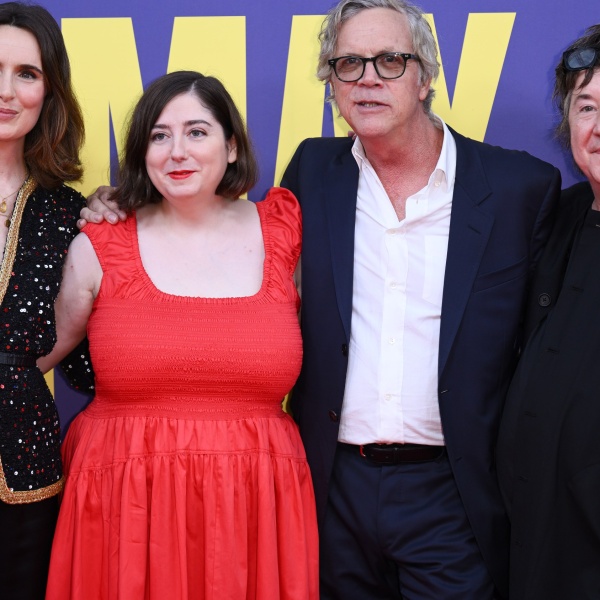
First released 50 years ago, after Francoist censors convinced themselves that its anti-authoritarian messaging would have little social impact if buried under such a “boring” art film, Victor Erice’s “The Spirit of the Beehive” follows a gullible six-year-old girl named Ana (Ana Torrent), who sees a screening of “Frankenstein” when a mobile cinema arrives in the small Castilian village where she lives with her family in the Spanish Civil War’s immediate aftermath. Confused and horrified by the sight of Frankenstein’s monster accidentally killing a child, and the townspeople then killing Frankenstein’s monster in return, Ana’s elder sister tells her that neither of those things actually happened — that everything you see in films is fake. Later, with the memories of James Whale’s movie still fresh in her mind, Ana discovers a wounded republican soldier hiding in a sheepfold and decides to treat him with kindness instead of fear. It makes no difference to his ultimate fate. Ana’s sister was only half right in the end: “Frankenstein” may be a work of fiction, but fiction isn’t the same thing as “fake.”
Erice has only made three other features since his spellbinding debut, but all are set in the liminal space between film and reality. A similarly haunting drama about a girl whose relationship to her father — and to history itself — is forever changed by the discovery that he was in love with a movie star before Franco’s rise to power, 1983’s “El Sur” also filtered the afterimage of the Spanish Civil War through the lens of a projector, thereby framing the cinema as a medium connecting people to their lived and imagined pasts. After a nine-year absence (short by his standards), Erice returned with 1992’s “Dream of Light,” a self-reflexive narrative/documentary hybrid that saw a painter struggling to reconcile his finite mortality with the timelessness of artistic creation.
More than three decades later, Erice has come back in from the cold with a 169-minute epic that effectively finds him doing the same thing on his own terms. In some respects, it feels like the most nakedly personal film the now 83-year-old has ever made. In others, it feels like the only film he’s ever made. Or maybe all of them.
Sedate but ultimately shattering by dint of its simplicity (and its absolute slam-dunk of a final scene), “Close Your Eyes” is neither an autobiographical cine-memoir à la “The Fabelmans” nor a teary-eyed tribute to the magic of the movies in the vein of “Cinema Paradiso.” Yet, as if by accident and divine purpose all at once, it also becomes both of those things by the end. Set at the dawn of the streaming age and shot with the funereal sterility that came with it, “Close Your Eyes” openly laments the loss of a more tactile film experience (the kind that included actual film), but only so that it can honor the way certain images take root inside us when seen under the right circumstances, as inextricable from our being as a soul from its body.
In other words, “Close Your Eyes” is a sigh of resignation over film’s semi-forgotten value as an archival medium, and, as if to spite the gloomy flatness of its digital veneer, it embraces that part of its identity with a literalness endemic to Erice’s otherwise poetic work. In this case, that means opening with a gorgeously lensed 16mm prologue that feels like a scene in one of the director’s other movies, but here serves as an elaborate fake-out of sorts.
The year is 1947, the atmosphere is as thick from the fallout of World War II as Erice’s previous films were from that of the Spanish Civil War, and a man played by José Coronado arrives at a French estate whose ailing owner asks him to travel to Shanghai and recover his long-estranged daughter so that he might look upon her face one last time before he dies. As our hero walks out of the house after accepting his mission, the image freezes, and the action jumps forward to a gray morning in Madrid circa 2012.
That prologue, we learn, was not “real,” but rather one of the only completed sequences from a fictitious 1990 adventure drama called “The Farewell Gaze,” whose production permanently shuttered after the sudden disappearance of its lead actor, Julio Arenas (Coronado). The film’s star was never seen again, its once-promising director (Manolo Solo as an obvious Erice stand-in named Miguel Garay) was so shaken by the loss of his friend and/or the blow to his own career that he abandoned filmmaking altogether and began a modest new life along the Almerían coast, where he works as a third-rate novelist and part-time translator. Summoned to the big city to be interviewed for an investigative television show about Julio’s evaporation — precisely the kind of show that would soon become the bread and butter of the streaming world — Miguel finds himself digging into his past at the behest of the future being paved over it.
If “Close Your Eyes” unfolds along the trajectory of a detective procedural, it does so at such an unhurried pace that it seldom feels in service to its central mystery. The matter of Julio’s whereabouts — if he’s even still alive — proves intriguing enough, and Erice’s storytelling is never so abstruse that it asks viewers to prepare for some kind of Antonioni-esque non-explanation. But the question of what happened to him is largely subsumed by the various other questions raised by his absence.
One of them is asked by the missing actor’s middle-aged daughter, who works at the Prado Museum, a curious job for a woman so frustrated by the elusiveness of her own past. Also curious: The fact that she’s played by Ana Torrent, who starred in Erice’s debut film a half-century earlier, and now brings an extra note of self-examination to the director’s most explicit meditation on the essence of moviemaking. “How is it possible he left me nothing?” she wonders about her absent father, but her conversations with Miguel — strained at first but then ineffably tender — suggest that her sense of inheritance may be somewhat inaccurate.
Miguel naturally has questions of his own (e.g., how to deal with the “supreme issue” of getting old), but his enduring reluctance to confront them is what forces “Close Your Eyes” to move at the speed of a sleepwalker, and also what allows for its dreamiest and most beautiful moments of discovery. At one point, after the film has downshifted to its slowest gear, Miguel and his Almerian neighbors launch into an impromptu rendition of “My Rifle, My Pony and Me” from “Rio Bravo.” Muted by Valentin Álvarez’s anti-romantic digital cinematography, the sing-a-long is shot in such deceptively incidental fashion that it almost feels like a directorial indulgence, but hindsight reveals the scene — in which the memory of movies’ past almost unconsciously seeps into the present — as the heart of this film’s quiet power.
The scene also serves as a gateway of sorts to the film’s extremely rewarding third act, so patient and relaxed about its massive revelations that it threatens to betray how important they are. The story’s last moments assume a visceral inevitability long before Erice finally arrives at them, but at some point along the way, the casualness of his approach becomes an unmistakable sign of supreme confidence, as the power of those closing shots has nothing to do with surprise, and everything to do with the privilege of seeing (to paraphrase a character from “The Farewell Gaze”). “You think a movie can bring about a miracle?” Miguel asks his old editor friend. “The movies haven’t been able to do that since Dreyer,” the man replies with a laugh.
He may be laughing, but that doesn’t mean he’s making a joke. Another key line from “The Farewell Gaze,” from which every word resonates throughout the rest of Erice’s film: “You lost your war.” A movie gently massacred across several different battles at once, “Close Your Eyes” is as doomed in its fight against the death of celluloid — and its attendant romance — as its fight against death itself. The movie theater where much of the third act takes place closes when our characters arrive there, and the proprietor has to re-open it especially for them. The people who file inside have similarly dim prospects for the future, and even a miracle worthy of Carl Th. Dreyer himself would be powerless to change that in the end.
And yet, by summoning the ghost of Maria Falconetti in a remarkable series of close-ups that channel “The Passion of Joan of Arc,” Erice is nevertheless able to fulfill cinema’s miraculous promise as a vehicle of eternal return; as a magic trick capable of keeping the past alive long after it’s already died within us. The movies are real, “Close Your Eyes” insists with the intensity of an old master seizing what might be his last chance to say it. How much of ourselves will we lose if we forget how to project them properly?
Grade: B+
“Close Your Eyes” screened at the 2023 New York Film Festival. It is currently seeking U.S. distribution.


